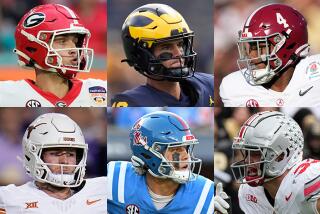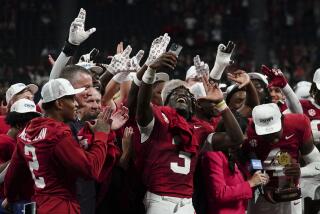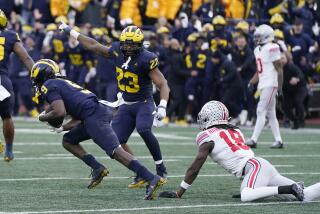BCS Reacts in Orderly Fashion
- Share via
Order (for now) has been restored in the bowl championship series standings, and that order is USC, Oklahoma and Miami.
Last week’s first release of the BCS standings caused a small uproar when Miami, ranked No. 4 in the media and coaches’ polls, opened in second position ahead of Oklahoma, No. 2 in both human polls.
This week’s standings more accurately reflect popular sentiment -- unless you’re from Coral Gables, Fla.
USC retained its firm grip on the overall lead with a BCS average of .9843, although the Trojans did slip from No. 1 to No. 2 in the computer index.
Oklahoma is No. 2 at .9325, followed by Miami at .9239. Rounding out the BCS top 10: Auburn, Florida State, Utah, Wisconsin, California, Georgia and Texas.
The top two teams in the final BCS standings Dec. 5 will advance to play for the BCS national championship in the Jan. 4 Orange Bowl.
Reaction from Oklahoma Coach Bob Stoops was predictable.
“It’s really no different than what I said last week,” Stoops said in a released statement. “It just doesn’t matter much yet. We have to play Oklahoma State this week. That’s the only thing we’re focused on.”
Utah’s move from No. 7 to No. 6 was significant because the Utes would be assured of a major bowl bid if they finished sixth or higher in the final BCS standings.
Utah is seeking to become the first team from outside the major-conference power structure to earn a bid to a BCS bowl game -- Rose, Sugar, Fiesta or Orange.
For geographical reasons, Utah probably would end up in the Fiesta Bowl, especially if that bowl lost its “anchor” tie-in, Oklahoma, to the Orange Bowl.
There also is a scenario in which Utah could end up in Pasadena should the Rose Bowl lose USC to the national-title game and another Pac-10 team is not available.
For Utah, though, holding on to the No. 6 spot is no sure thing. The Utes boast a powerful No. 5 computer ranking this week, thanks to nonconference wins against BCS schools Texas A&M;, Arizona and North Carolina. That computer number could weaken, though, as the Utes finish the season against weaker opponents from the Mountain West Conference.
Oklahoma was able to jump ahead of Miami this week because the Sooners’ computer ranking improved from No. 5 to No. 4. Miami is ranked No. 1 in the computers but only No. 4 in the AP poll.
BCS Coordinator Kevin Weiberg predicted last week that the system would correct itself. All the dry-run models the BCS ran indicated it would be very hard for a team ranked No. 2 in both polls to finish No. 3 in the BCS standings.
It would require the No. 2 team to have a computer ranking of No. 5 or worse.
That’s exactly what happened last week when Oklahoma opened at No. 5 in the computers.
“I think it’s very unlikely that this would hold up through the balance of the season,” Weiberg said at the time.
Turned out it took Oklahoma only one week to claim the No. 2 BCS position.
Other BCS moves to note: Arizona State moved from No. 18 to No. 15, while Texas El Paso, led by first-year Coach Mike Price, made a surprise appearance at No. 24.
The Miners, at 5-2, need one more victory to match their win total for the previous three seasons combined.
This year’s BCS formula has been simplified and weighted one-third each for the Associated Press media poll, the ESPN/USA Today coaches’ poll and the computer component.
The final BCS standings still could end up controversial should more than two teams finish the season undefeated. Six of the current top seven teams have yet to lose a game.
More to Read
Go beyond the scoreboard
Get the latest on L.A.'s teams in the daily Sports Report newsletter.
You may occasionally receive promotional content from the Los Angeles Times.







